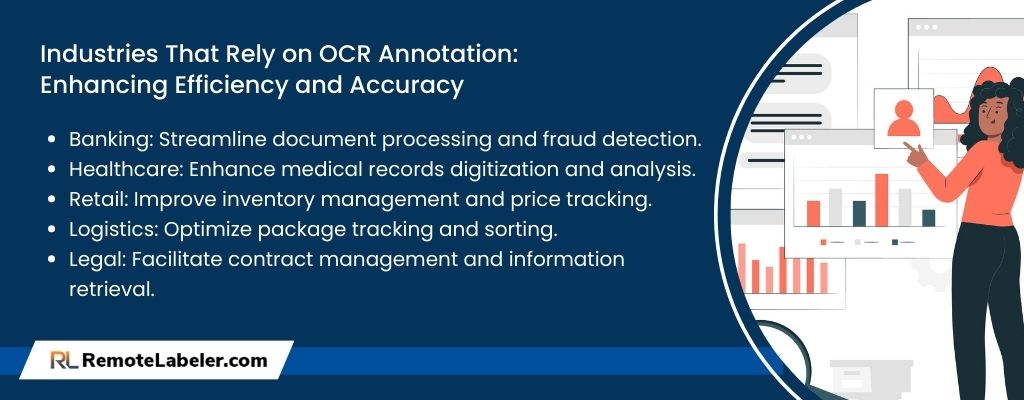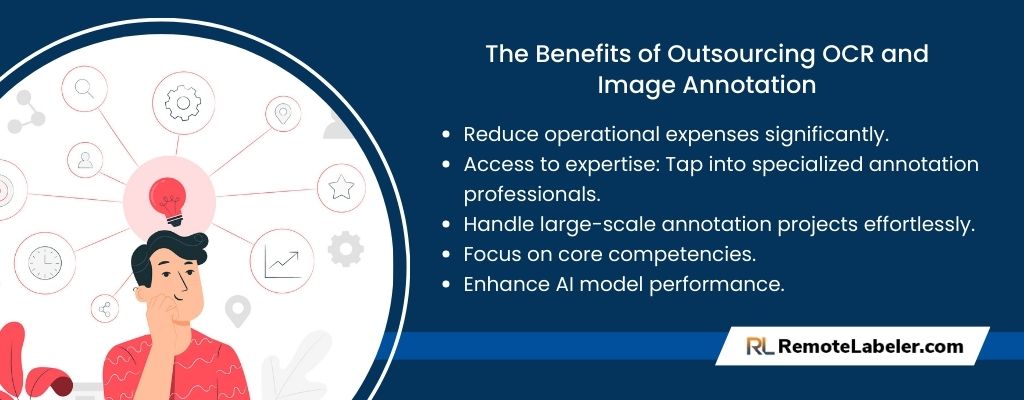In today’s digital age, the demand for accurate and efficient OCR (Optical Character Recognition) annotation and image annotation in deep learning is on the rise. From document processing to computer vision applications, businesses across various industries rely on image pattern recognition and OCR annotation for extracting valuable information from images and documents. However, the process of data labeling and classification in deep learning can be complex and time-consuming, requiring specialized skills and resources.
This is where outsourcing becomes the ultimate business solution. By partnering with a trusted service provider like Remote Labeler, companies can leverage the expertise of professionals in OCR annotation, image pattern recognition, and image annotation deep learning. Outsourcing OCR annotation and image annotation not only frees up valuable internal resources but also ensures high-quality results that drive accurate machine learning models. This post will delve into the benefits and process of outsourcing OCR annotation with image annotation in deep learning, highlighting how this strategic decision can revolutionize your business operations and unlock the true potential of your data.
Understanding OCR Annotation and its Importance in Deep Learning
OCR annotation, or Optical Character Recognition annotation, plays a vital role in deep learning applications by converting scanned or digital images containing text into machine-readable data. It involves the accurate labeling of individual characters, words, and paragraphs in the image to enable text recognition algorithms to process and understand the content. Industries across various sectors rely on OCR annotation to extract valuable insights, automate data entry, and enhance document analysis. Some examples of industries where OCR annotation is crucial include:
- Banking and Finance: OCR annotation facilitates automated data extraction from financial documents, invoices, and receipts, enabling streamlined processes for accounting, auditing, and fraud detection.
- Healthcare: OCR annotation is essential for digitizing medical records, extracting patient information, and enabling efficient data analysis for diagnosis, research, and patient care.
- Legal: OCR annotation assists in the digitization of legal documents, contract analysis, and information retrieval, improving efficiency in legal research and case management.
- Retail and E-commerce: OCR annotation supports inventory management, product recognition, and automatic data entry from invoices and shipping documents, optimizing supply chain operations.

The synergy between OCR and image annotation is significant in deep learning applications. While OCR focuses on extracting text from images, image annotation enhances the accuracy and reliability of OCR by providing context and identifying specific regions of interest within the image. Accurate OCR image annotation is crucial for successful deep learning models as it enables better text recognition, language understanding, and semantic analysis. By labeling individual characters, words, or regions of text within the image, OCR image annotation empowers deep learning algorithms to interpret and extract meaning from text data with higher precision and efficiency.
The Role of Image Annotation in Deep Learning
In the realm of deep learning, image annotation plays a pivotal role in training and fine-tuning models for various tasks, including object detection, segmentation, and classification. By annotating images with bounding boxes, polygons, or semantic labels, image annotation provides ground truth data that serves as a reference for teaching algorithms to recognize and interpret objects accurately. The benefits of image annotation for deep learning models are manifold:
- Improved Model Performance: High-quality image annotation ensures that deep learning models can learn from accurately labeled data, resulting in improved object detection, segmentation, and classification accuracy.
- Robust Training: Image annotation allows for the creation of diverse and representative training datasets, enabling models to generalize well to unseen data and real-world scenarios.
- Domain-Specific Applications: Image annotation can be tailored to specific domains, such as medical imaging, autonomous driving, or satellite imagery, facilitating the development of specialized deep learning models.
- Video Annotation: Video annotation, a subset of image annotation, involves labeling objects, actions, or events in video frames. It enables the training of deep learning models for video analysis, surveillance, and activity recognition.
Thus, outsourcing OCR annotation with image annotation in deep learning provides businesses with the ultimate solution for leveraging the power of text and image data. Accurate OCR image annotation enhances the performance of deep learning models, enabling businesses to automate processes, gain valuable insights, and unlock new opportunities in various industries. By harnessing the synergy between OCR and image annotation, businesses can achieve remarkable efficiency, accuracy, and innovation in their deep learning endeavors.
Why Outsource OCR and Image Annotation?
In the world of deep learning, OCR (Optical Character Recognition) annotation and image annotation play crucial roles in training and enhancing algorithms. However, these tasks can be both time-consuming and resource-intensive. This section delves into the potential challenges associated with OCR and image annotation and explores how outsourcing can effectively address them.

Increased Efficiency and Productivity
OCR annotation requires the accurate identification and labeling of text within images or documents. Similarly, image annotation involves categorizing and labeling objects, regions, or attributes within an image. Both tasks demand meticulous attention to detail, which can be time-consuming for an in-house team.
By outsourcing OCR and image annotation to a specialized service provider, businesses can leverage the expertise of trained professionals who are well-versed in the intricacies of these tasks. This external support enables organizations to streamline their workflows, increase productivity, and focus on core competencies, thus accelerating the development of deep learning models.
Access to Expertise and Specialized Skills
The field of deep learning is continuously evolving, and keeping up with the latest OCR techniques and image annotation methodologies can be a daunting task. Outsourcing OCR and image annotation ensures access to a pool of experts who possess the necessary knowledge and expertise in the domain.
Professional data labeling providers often employ highly skilled individuals who understand the nuances of OCR annotation and image annotation. Their experience in handling diverse datasets and employing advanced annotation techniques can significantly enhance the quality and accuracy of labeled data, resulting in improved deep learning models.
Scalability and Flexibility
Deep learning projects often require large volumes of labeled data to achieve optimal performance. However, assembling an in-house team capable of handling such data annotation tasks can be costly and time-consuming. Moreover, the demand for annotation services may fluctuate throughout the project lifecycle.
Outsourcing OCR and image annotation provides businesses with the flexibility to scale their annotation requirements based on project needs. Service providers specializing in data labeling and classification possess the infrastructure and workforce to accommodate variable workloads efficiently. This scalability allows businesses to adapt to project demands seamlessly, without compromising quality or incurring additional overhead costs.
Cost-Effectiveness and Budget Optimization
Maintaining an in-house team dedicated to OCR annotation and image annotation can be financially burdensome for businesses, especially for smaller organizations or startups. Expenses related to recruitment, training, infrastructure, and software can quickly accumulate, diverting resources from other critical areas.
Outsourcing OCR and image annotation offers a cost-effective solution, allowing businesses to optimize their budgets. By partnering with a trusted data labeling provider, organizations can access top-tier annotation services without the need for substantial upfront investments. This cost-efficient approach enables businesses to allocate resources strategically, ensuring the maximum return on investment (ROI) for their deep learning initiatives.
Choosing the Right OCR Deep Learning Service Provider
When it comes to outsourcing OCR and image annotation, selecting the right service provider is crucial. Choosing a trusted data labeling partner can greatly impact the quality of labeled data and, consequently, the performance of deep learning models. Remote Labeler is a professional and trusted data labeling provider that offers a comprehensive range of services tailored to meet the specific needs of businesses.

Here are some key benefits of partnering with Remote Labeler:
- Expertise and Experience: Remote Labeler boasts a team of highly skilled professionals with extensive experience in OCR annotation and image annotation. Their expertise spans across various domains and datasets, ensuring accurate and reliable results.
- Advanced Annotation Techniques: With a deep understanding of deep learning annotation, Remote Labeler employs advanced techniques and tools to provide superior annotation quality. By leveraging state-of-the-art technologies, they enhance the accuracy and efficiency of OCR and image annotation tasks.
- Quality Control and Assurance: Remote Labeler follows stringent quality control measures to maintain the highest standards in data labeling. Their comprehensive quality assurance processes include multiple rounds of review and validation, ensuring the delivery of precise and error-free annotations.
- Scalability and Timeliness: As a reliable partner, Remote Labeler possesses the resources and infrastructure necessary to handle projects of varying sizes and complexities. Their ability to scale operations efficiently ensures timely delivery, even when faced with demanding project schedules.
- Confidentiality and Security: Remote Labeler understands the importance of data security and confidentiality. They adhere to strict privacy protocols and implement robust security measures to safeguard client data throughout the annotation process.
- Customized Solutions: Recognizing that each project is unique, Remote Labeler offers customized solutions tailored to specific requirements. They collaborate closely with clients to understand their objectives and deliver personalized annotation services that align with their deep learning goals.
Conclusion
The role of OCR annotation and image annotation in deep learning cannot be overstated. These tasks serve as critical components in training and refining algorithms, enabling businesses to unlock the full potential of their data. By outsourcing OCR and image annotation, organizations can overcome the challenges associated with these tasks and gain several significant advantages.
Outsourcing enhances efficiency and productivity by leveraging the expertise of trained professionals. It provides access to specialized skills, ensuring high-quality annotations and accurate labeled data. Moreover, outsourcing offers scalability, flexibility, and cost-effectiveness, allowing businesses to optimize resources and focus on core competencies.
Choosing the right OCR deep learning service provider is paramount to ensure successful outsourcing. Remote Labeler emerges as a professional and trusted partner, offering expertise, advanced annotation techniques, stringent quality control measures, scalability, and a commitment to confidentiality and security. By collaborating with Remote Labeler, businesses can harness the benefits of outsourcing OCR and image annotation, empowering their deep learning initiatives and gaining a competitive edge in the market.
Remember, accurate and efficient OCR and image annotation are the keys to unlocking the potential business advantages that deep learning has to offer. Partnering with a reliable data labeling provider like Remote Labeler sets the stage for success in the dynamic landscape of artificial intelligence and machine learning.
- Emerging Trends and Future Outlook: The Data Labeling Industry in 2024-2030 - December 8, 2023
- Landmark Annotation: Key Points - November 6, 2023
- All You Should Know About Bounding Box Annotation - November 5, 2023